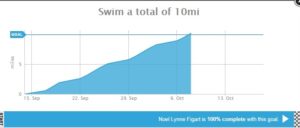Mis-assigning Virtue
Often we associate virtue and physical fitness. Blame it on the Spartans or Romans if you want, or blame it on the Puritans. But because exercise can be hard or painful, we can associate it somehow with virtue.
Muscle mags are probably some of the worst offenders for this. You’ll find lots of articles sneering at fat, lazy slobs and a great deal of self-congratulations for a great physique and by implication, perfect health. Sometimes it can be hard to wade through them to get to some genuinely good information.
Being physically fit isn’t a moral imperative, nor is being healthy. There are lots of reasons why being more active is good and they’re discussed all through this book. You may have a million reasons to do what you do (or don’t). Since you’re in charge of your life, you get to decide this.
The human body did not evolve to be sedentary for long periods of time – true enough. Many people find regular movement has the benefits of mood improvement and an increased sense of well-being. Many people also find that hard, punishing exercise just makes them depressed and wanting to quit. Plenty of people have it worse than that, and punishing type exercises is emotionally triggery. Amazing what some high school gym teachers can do to discourage health and fitness, innit?
The reality is, yes, you do have to put in some maintenance on your body for it to perform well. The reality is also that you’re under no moral obligation at all to become an athlete if it doesn’t suit you. The reality is that you’re under no moral obligation to maintain your body, either. Obviously I find being active desirable, and I do genuinely believe it leads to a greater quality of life, but I’d be the last person on Earth to choose whether or not it does for you.
A great deal of finding out what’s going to make you more fit and feel better will be a constant series of corrections. This will be a pretty fluid boundary as well. If you stop exercising, you’ll find your light workout from your fit days will feel terrible to you. While consistency is ideal, don’t be a fool. You’re not doomed to a lack of movement because you have your exercise ups and downs.
You don’t owe the world “pretty”
Part of the reason, I think, that women are encouraged to exercise and “get fit” is a bloody lie. It is not about getting fit. It is about the idea that it is a woman’s responsibility to be pretty. If it helps, I’ll let you off the hook. You don’t owe the world physical attractiveness, so don’t let anyone tell you that you do.
Don’t let people use fit as a euphemism for pretty. There are plenty of physically fit Olympic athletes who would not be picked for modeling contracts. Challenge people when they try to map pretty to physically fit, and maybe we can chase that idiotic canard out of the English language. Except in the most extreme of cases –more to do with malnutrition, you cannot tell either physical fitness (for whatever value of fit you’re discussing) or health from appearance. Being strong and healthy might do things you like to your appearance, sure. That’s dandy, but what it does to your quality of life is far more important.
Your value as a human being is not about how many people want to fuck you. Sorry for the bluntness, but that’s what it boils down to. Don’t buy into that nonsense. Yeah, yeah, people talk about biological programming, but men are biologically programmed to rape any woman that smells like she’s ovulating, too. Five men in six have never committed a rape at all. Let’s not act as if we don’t have minds and wills, too, okay?
Making a disconnect between “unpleasant” and “good”
You might have gotten the idea from gym class. You might have gotten it from someone who was trying to teach you self-discipline, but kinda went overboard. But you might be thinking that if it hurts and it is difficult, it must be good for you.
Nonsense.
Exertion and challenge is one thing. I’m all for challenging oneself a bit during an exercise session, mind. Just don’t be an idiot about it. There’s a serious difference between challenge and punishment.
Self-discipline v. self-punishment
I’d be the first to say self-discipline is important. Except, I wasn’t. Would you believe other people have said it before me? No. Fine…
But yes, getting into the habit of being physically active when you have been sedentary for a while does take a fair whack of self-discipline. No-one is excited about their workout every single time they do it. In fact, there are many days when the best thing I can say about my workout is that I did it. Sure, sure, sometimes it feels glorious and wonderful. Other times, I plod.
Ultimately, what matters is not that I felt glorious or that I plodded through it. Nope. The important thing is that I did it. My body will not care how I felt about it, but muscles will be stronger and the heart will be pumping better because of the work I put in.
There’s a difference, however, between self-discipline and self-punishment. Even if you hate working out, it is not supposed to hurt. If you’re going for any sort of pain, it is because pain is your kink, not because your body needs it to get a good workout or enough movement to stay in good shape.
I won’t even push the “hurt so good” feeling some people (including me) sometimes go for. You don’t have to do it to get a productive workout. People who do it are going for an adrenalin high. You don’t have to do this to get fit. Some people just don’t get this feeling, and it is okay. While you do need to move your body to keep it in working order, anyone who says it has to hurt is a little maso. If you’re not, you can safely ignore them.
Now, that’s not to say that challenging yourself a little is bad. Challenging yourself some is a good idea. It’ll keep you interested, and boredom is often a problem with exercise, especially among geeks. I think it is no accident that when we do work out, we tend to gravitate towards sports that can be translated into a lot of math like weightlifting, or tend to be very physically technical, like martial arts or swimming.




